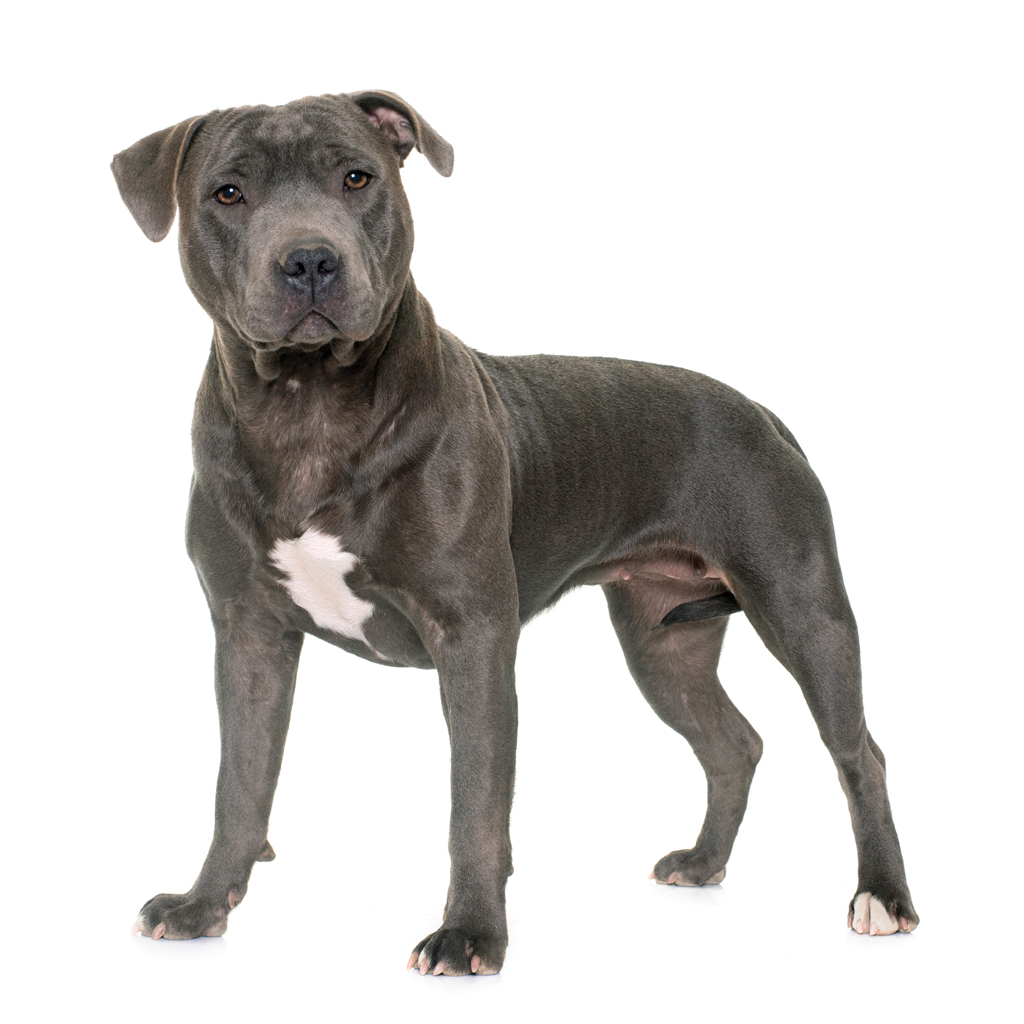
Colorado Breed-Specific Legislation and Criminal Defense
October 2020

This article discusses criminal defense issues related to charges involving banned animal breeds.
A client calls your firm looking for a defense attorney. The client has been charged with several serious misdemeanors and was told that a felony charge is possible. The client is facing thousands of dollars in fines, thousands more in restitution, and jail time. You are told that among the charges this client faces are two counts of owning a dangerous dog and two counts of violating the local prohibition on owning certain dog breeds. The client’s main concern, however, is making sure the dogs are not killed.
Practicing criminal defense attorneys may occasionally find themselves involved in the field of animal law because most animal-related laws are governed through criminal enforcement statutes. Charges for violating zoning restrictions, owning dangerous dogs or exotic animals, and animal cruelty all come with criminal penalties, some of which are serious. It is rare to encounter clients with charges for violating breed bans1 without additional charges, such as a dog at large or a dangerous dog, because individuals charged only with violating an ordinance for possessing a banned breed are inclined to handle their cases without legal representation.
This article discusses animal law cases that involve the additional element of possessing a banned breed. Such cases have a complicated and contentious origin and present numerous challenges for criminal defense attorneys.
The Evolution of Colorado Breed-Specific Legislation
The term “breed-specific legislation” (BSL) is a “blanket term for laws that either regulate or ban certain dog breeds in an effort to decrease dog attacks on humans and other animals.”2 Colorado BSL started in Denver in 1989 and was enacted following two high-profile attacks that involved pit bulls. The first involved the death of a toddler, and the second concerned a minister who suffered dozens of bite wounds and two broken legs.3 The Denver ordinance that followed made it unlawful for any person to “own, possess, keep, exercise control over, maintain, harbor, transport, or sell within the City any pit bull,”4 and contained a licensing scheme that grandfathered in previously licensed pit bulls.5 But a “pit bull” is not, in fact, a breed of dog. Rather, it is an amalgamation of several different American Kennel Club-recognized breeds. The Denver ordinance thus defined a “pit bull” as:
any dog that is an American Pit Bull Terrier, American Staffordshire Terrier, Staffordshire Bull Terrier, or any dog displaying a majority of physical traits of any one (1) or more of the above breeds, or any dog exhibiting those distinguishing characteristics which substantially conform to the standards established by the American Kennel Club or United Kennel Club for any of the above breeds. The A.K.C. and U.K.C. standards for the above breeds are on file in the office of the clerk and recorder, ex-officio clerk, of the City and County of Denver, at City Clerk Filing No. 89457.6
A group of animal welfare organizations swiftly filed suit against the city, challenging the constitutionality of the ban. However, in 1991, the Colorado Supreme Court ultimately held that the ordinance, as modified by the trial court, was constitutional.7 Therefore, the ban has remained in place and similar legislation has since expanded to other parts of the state.
In 2004 the state enacted CRS § 18-9-204.5, a “ban on bans,” attempting to end the use of BSL in Colorado. The statute states that “[n]othing in this section shall be construed to prohibit a municipality from adopting any rule or law for the control of dangerous dogs; except that any such rule or law shall not regulate dangerous dogs in a manner that is specific to breed.”8 The statute aims to target behaviors rather than breed identifications and to emphasize owner responsibility through increased fines and other penalties.
CRS § 18-9-204.5 was the subject of controversy among the City of Denver, private citizens, and animal welfare organizations. The City of Denver sought a declaratory judgment stating that its own ban was constitutional under this new state statute. Ultimately, in 2004 Denver’s status as a “home rule” city factored into the court’s declaratory judgment, which allowed the city to keep its ban in place and set a legal standard for other jurisdictions to continue to enact their own bans.9
Animal welfare organizations and several citizens challenged the existing Denver ban as unconstitutionally vague on its face and a deprivation of substantive due process under this new state statute, and the district court dismissed the case.10 The Tenth Circuit affirmed the dismissal of the vagueness claim but remanded for further proceedings on the substantive due process claim,11 which was subsequently dismissed with prejudice12 after a procedural victory by defendants.13
Opposition to BSL has not subsided, and on January 22, 2020, the Denver City Council introduced an ordinance that would modify the BSL to allow for the reintroduction of pit bulls under limited circumstances. The modification passed with a vote of 7 to 4.14 However, the amending ordinance was ultimately vetoed by Mayor Hancock in the first exercise of his veto power since he took office in 2011.15
Ongoing advocacy efforts to repeal BSL continue, and some Colorado jurisdictions have already rescinded their breed bans.16 Many prominent national organizations with experience in dog behavior support repealing breed bans,17 and even the American Bar Association (ABA) has urged all localities to repeal breed-specific provisions.18 Given such opposition to BSL and the speed with which municipal governments can operate, practitioners should pay attention to their local government’s legislative activities.
Complications Arising from Breed-Specific Legislation
The following are some of the most common issues that practitioners and their clients encounter in criminal defense cases involving BSL.
Impoundment Costs
The foremost complication in BSL cases is impoundment fees, which are the costs a municipality or government-contracted agency incurs in taking and holding an animal at the center of an animal ordinance violation. Many defendants are precluded from engaging in detailed negotiations or proceeding to trial simply because they cannot afford to accrue hundreds or thousands of dollars in impound fees while those processes go on.
While these fees can be recoverable in cases where a defendant is acquitted of all charges, they must be paid upfront on weekly or monthly timetables, which can be difficult for many defendants. A failure to pay the impound costs results in the automatic forfeiture of the animal, regardless of whether the owner has been found guilty.19 Thus, a defendant may feel pressure to accept the first iteration of a plea offer simply to end the ongoing impound fees.
Moreover, unlike other animal-related crimes, BSL violation charges frequently carry increases to impound costs of as much as 100%. Denver’s current standard impound fees for a dog are $55 dollars and $10 per day, but $100 dollars and $15 per day for a banned breed.20 A defendant with two impounded dogs that are both banned breeds can expect impound costs in excess of $1,000 dollars for the first month alone. These fees continue until the day the case ends.
Denver uniquely allows its animal control agencies the authority to reduce or waive impound fees due to financial hardship or other issues,21 but such actions are not always forthcoming.22 And even if a client is entitled to a public defender, impound fee waivers or reductions are discretionary23 and should not be expected.
The Knowledge Gap
Despite the history of BSL and the underlying criminal statutes related to animal enforcement, knowledge of these laws among attorneys and judicial guidance are sparse. Officers of the court on all sides frequently lack a mutual understanding of the procedure, simply due to the rarity of animal cases on the criminal docket. This can make defense more difficult, time consuming, and costly. Numerous attorney hours can be spent trying to untangle procedural snarls and getting courts, prosecutors, and defendants to a common frame of reference.
The lack of decisive appellate court opinions on many animal law issues means that courts in different jurisdictions may apply nearly identical laws in vastly different ways. Thus, attorneys need to be familiar with the approaches applied in the court where a case is docketed.
The Influence of Animal Control Agents
Animal control agencies themselves present an additional complication. Given the infrequency with which prosecutors see BSL cases, they may be more inclined to defer to the judgment and analysis of animal control agents when considering how to handle these cases. Statements from animal control that focus on the danger the dog poses, or the danger a defendant poses as a negligent dog owner, can be particularly damaging to the defendant’s case for purposes of negotiation, as most prosecutors state that their main concern is the community’s safety. Therefore, attorneys should not be surprised if they at first believe they have succeeded in negotiating a viable plea agreement for their client, only to have a prosecutor come back with a much less favorable offer after discussing the case with animal control agents.
Impoundment Hearings
Defense attorneys need to pay close attention to local ordinances with respect to burdens of proof. For example, Denver, Colo., Rev. Mun. Code § 8-65 gives a court ex parte power upon motion by the city to continue impoundment of an animal when animal attack, dangerous animal, or potentially dangerous animal charges are present. In those cases, § 8-65 allows the court to impound the animal if “reasonable grounds exist to find that an animal may constitute a danger to any person or persons if not impounded.” Because that section only applies where charges have been filed based on an animal being dangerous, the defendant’s right to dispute the necessity of impoundment is severely limited.
BSL charges further exemplify these fragile due process protections, particularly when combined with charges for dangerous animals or animal attacks. Because BSL characterizes banned breeds presumptively as a danger to people, overcoming that presumption can be difficult and frequently requires proving that the dog is not a banned breed. If a defendant is unable to prove the dog is not a banned breed or prove why the breed ban does not apply in this instance,24 requesting a hearing for the dog’s pro tem release may be futile and may further drain a defendant’s financial resources.
Attorneys should be aware that certain jurisdictions require a written request for an otherwise optional hearing if a defendant wants the opportunity to reclaim a dog impounded under BSL. For example, in Commerce City, a defendant who fails to request in writing such a hearing, which is likely to occur before arraignment, is deemed to have abandoned the animal.25 Because these optional hearings are triggered by BSL or sometimes an ordinance’s dangerous dog provisions, the dog may be killed upon failure to request this hearing and the subsequent default abandonment.26
Attorneys should also be aware of the shifting evidentiary standards and with whom the burden of proof rests in impoundment hearings. Commerce City, for example, has a complex and lengthy “right to impoundment hearing” for banned breeds where the city must “establish by a preponderance of the evidence that the animal is likely to be found at trial to be a pit bull” and that “the animal shall be immediately released to the owner pending disposition of the charges.”27
Defenses and Statutory Protections
There are a few circumstances in which local code provisions or other statutory protections provide key defenses in BSL cases.
Evidentiary Standards
Local code provisions that allow evidence to refute a determination that a dog is a banned breed may provide a helpful defense. For example, Aurora, Colo., Code § 14-75 (b)(7) and (8) allows for DNA evidence that can “override any subjective evidence including observational findings to the contrary.” Some jurisdictions permit relaxed evidentiary standards, such as Commerce City, whose code provides that “[t]he impoundment hearing shall be informal, and the rules of evidence shall be relaxed. Any relevant facts the owner wishes to be considered shall be submitted at the hearing.”28
Other defenses or strategies can protect a dog from being killed, even in cases where the dog is clearly prohibited by the breed-specific ordinances and no reasonable defense is otherwise available. For example, Aurora permits dogs to be kept alive if “the owner produces evidence deemed sufficient by the court that the pit bull is to be permanently taken out of the city.”29 30 and Lone Tree31 have similar removal provisions so as to avoid destruction of the dog. Other jurisdictions’ relaxed evidentiary requirements during disposition hearings may provide opportunities to enter similar evidence that a prohibited breed of dog can be placed safely outside of a city. For example, the Commerce City code requires the city to establish “by a preponderance of the evidence that there is a reasonable likelihood of future injury to persons, property or animals, [before] the municipal court may order the animal destroyed in a humane manner.”32 Evidence showing that a banned breed will be removed from the city and will not pose a reasonable risk may preclude such a finding and stop a dog from being destroyed.
Federal Statutory Protections
Federal laws, and state codifications of federal protections such as the Americans with Disabilities Act (ADA) and the Fair Housing Act (FHA), provide an additional avenue to protect breed restricted dogs.33
While some local jurisdictions have codified ADA or FHA requirements into their BSL,34 most, and famously Denver,35 have not. Nevertheless, ADA regulations finalized on July 23, 2010 make it clear that the protections covering service animals within the act are not negated by a local jurisdiction’s BSL: “The Department does not believe that it is either appropriate or consistent with the ADA to defer to local laws that prohibit certain breeds of dogs based on local concerns that these breeds may have a history of unprovoked aggression or attacks.”36 The FHA has a similar guidance document, and while it does not state explicitly that the FHA preempts local BSL, it provides that “[b]reed, size, and weight limitations may not be applied to an assistance animal.”37 The effect of the federal protections essentially defeats application of BSL to service animals.
Nevertheless, the procedures for dealing with a service animal in a jurisdiction that has not codified federal protections, such as Denver, can be confusing.38 Moreover, disputes over the validity of claims that an animal is a service animal can further complicate matters. It should be noted that intentional misrepresentation of a service animal is its own crime in Colorado as of 2016.39 The lack of formalized recognition of a service animal as such does not preclude assertion of ADA or FHA protections, but will further complicate the process, especially in jurisdictions without clear statements applying BSL to service animals or exempting them from BSL.
Conclusion
BSL has always been controversial and can create uncertainty in jurisdictions where it exists. While BSL’s legality has been questioned under numerous theories, courts have been unwilling to overturn BSL outright.
Most defendants faced with BSL and other animal law charges are primarily concerned with protecting their animals and avoiding substantial impoundment fees. Viable defenses and strategies can be deployed to assist such clients. Lawyers should remain alert to relevant local code provisions and legal interpretations applied in their specific jurisdiction. And given the uncertainty of the application or interpretation of animal laws in BSL cases, association or consultation with experienced counsel may be prudent.
Related Topics
Notes
1. As discussed in this article, multiple municipalities in Colorado have enacted prohibitions on ownership of certain dog breeds within that municipality, notably prohibiting “pit bull” type dogs, which are an amalgamation of several different American Kennel Club recognized breeds. Each city has its own description of what constitutes a pit bull or other banned breed within its jurisdiction.
2. ASPCA, What is Breed-Specific Legislation? (May 30, 2020), https://www.aspca.org/animal-protection/public-policy/what-breed-specific-legislation.
3. Maher, “For two decades, pit bulls have been public enemy #1 in Denver. But maybe it’s time for a recount.,” Westword (Sept. 24, 2009), https://www.westword.com/news/for-two-decades-pit-bulls-have-been-public-enemy-1-in-denver-but-maybe-its-time-for-a-recount-5105359.
4. Denver, Colo., Rev. Mun. Code § 8-55(a) (1989).
5. Denver, Colo., Rev. Mun. Code § 8-55(d) (1989), requiring an owner, among other things, to (1) annually renew a pit bull license, which must have been obtained by November 1, 1989; (2) prove that the dog has been spayed or neutered and has been vaccinated against rabies; (3) keep the dog confined or securely leashed and muzzled; and (4) maintain $100,000 in liability insurance.
6. Denver, Colo., Rev. Mun. Code § 8-55(b)(2). See also Colo. Dog Fanciers, Inc. v. City and Cty. of Denver, 820 P.2d 644, 646–47 (Colo. 1991).
7. Colo. Dog Fanciers, Inc., 820 P.2d at 654.
8. CRS § 18-9-204.5(5)(a) (emphasis added).
9. City and Cty. of Denver v. Colo., No. 04CV3756, Order at 4, 6 (Den. Dist. Ct. Dec. 9, 2004), https://www.animallaw.info/sites/default/files/pbuscodenver_state_order.pdf (“[T]he issue of which dog breeds are permitted, prohibited, or restricted within a city is matter of purely local concern . . . C.R.S. § 18-9-204.5, insofar as this statute purports to preempt the intra-city breed-based regulations contained in D.R.M.C. § 8-55, is invalid and unconstitutional under the Home Rule Amendment.”). However, local bans cannot restrict the intercity transport of pit bulls, which has been reflected in all local bans allowing for temporary transport. The Denver ban has since been upheld in more recent decisions. See, e.g., Dias v. City and Cty. of Denver, 567 F.3d 1169 (10th Cir. 2009).
10. Dias, 567 F.3d at 1173.
11. Id. at 1184.
12. Dias v. City and Cty. of Denver, Civ. Action No. 07-cv-00722-WDM-MJW, Doc. 126, Stipulation for Dismissal by all remaining parties (D.Colo. Nov. 29, 2011) ECF 126.
13. Dias v. City & Cnty. of Denver, Civ. Action No. 07-cv-00722-WDM-MJW, 2010 U.S. Dist. LEXIS 103814 at 24 (D.Colo. Sept. 29, 2010) (ordering individually named government officials dismissed and awarded costs while leaving open plaintiff’s substantive due process claim).
14. Denver City Counsel, Legislation History, File # 20-0071, https://denver.legistar.com/LegislationDetail.aspx?ID=4348531&GUID=B44E6268-3326-4061-8F8B-F241193F0204&Options=ID|Text|&Search=breed.
15. Denver is not the only Colorado jurisdiction with BSL. See Aurora, Colo., Code § 14-75—Unlawful keeping of pit bulls, enacted in 2005; Commerce City, Colo., Rev. Mun. Code § 4-2011—Pit bulls prohibited, enacted in 2005; Louisville, Colo., Code § 6.12.160—Pit bulls prohibited, enacted in 1994; Lone Tree, Colo., Code § 10-10-160—Unlawful keeping of pit bulls, enacted in 2006.
16. See Castle Rock, BSL enacted in 1993 and repealed by Ord. 2018-13; Simla, prior BSL repealed by Ord. 268, 7-8-2008.
17. See Humane Society of the United States, Breed-Specific Legislation (citing position of major organizational opinions in opposition to breed-specific legislation), https://www.humanesociety.org/resources/breed-specific-legislation.
18. ABA Resolution 100 (Aug. 2012), https://www.americanbar.org/content/dam/aba/administrative/mental_physical_disability/Resolution_100.pdf.
19. See Denver, Colo., Rev. Mun. Code § 8-148.5(e) (“If the owner or keeper fails to request a waiver, request a reduction, or pay the applicable impoundment, care, and provision costs, the owner or keeper forfeits the right to contest such costs and any ownership rights to the animal in question.”).
20. See City and County of Denver, Redeem Your Pet, https://www.denvergov.org/content/denvergov/en/denver-animal-shelter/lost-pets/reclaim-your-pet.html.
21. See Denver, Colo., Rev. Mun. Code § 8-9 (“The executive director may, in the executive director’s discretion, waive any and all fees authorized under the provisions of this chapter, in whole or in part, where the payment of such fees is a demonstrated financial hardship, or the waiver is otherwise in the public interest.”). See also Denver, Colo., Rev. Mun. Code § 8-148.5. Attorneys should be aware that this waiver is entirely discretionary and prepare defendants for the possibility that fees may not be waived.
22. Denver Animal Protection made no changes to its policies despite statewide shutdowns of trials by the Colorado Supreme Court. See Order Regarding COVID-19 and Operation of Colorado State Courts (Apr. 16, 2020) (extending original order until June 1, 2020), https://www.courts.state.co.us/userfiles/file/Media/COVID/4_16_20%20Chief%20Justice%20Order%20Regarding%20Court%20Operations.pdf. See also Order Regarding COVID-19 and Operation of Colorado State Courts (Mar. 16, 2020) (shutting down trials and other court functions), https://www.courts.state.co.us/userfiles/file/Court_Probation/Supreme_Court/Filing%20Information/COVID-19%20Order%2016Mar2020.pdf.
23. Id.
24. See the federal statutory protections cited infra note 33.
25. See Commerce City, Colo., Rev. Mun. Code § 4-4002(e)(1) (“Where no written request for an impoundment hearing is received by the municipal court within seven (7) days after impoundment, the animal shall be considered abandoned and may be placed for adoption or humanely dispatched or disposed of in accordance with subsection (g) of this section.”).
26. Id.
27. Commerce City, Colo., Rev. Mun. Code § 4-4002(e)(4).
28. Commerce City, Colo., Rev. Mun. Code § 4-4002(e)(2).
29. Aurora, Colo., Code § 14-75(e).
30. See Denver, Colo., Rev. Mun. Code § 8-67.
31. See Lone Tree, Colo., Code § 10-10-160(c).
32. Commerce City, Colo., Rev. Mun. Code § 4-4001(e).
33. See ADA, Title II and Title III, and 28 CFR § 35.104 (definition of service animal), 28 CFR § 36.104 (same). See also 42 USC § 3604 and 24 CFR § 5.303.
34. See generally Aurora, Colo., Code § 14-75 (c)(6), exceptions, and (e), impoundment.
35. The City of Denver has fought to maintain its BSL for a long time. After the ADA rulemaking was released, the Denver City Council voted against codifying exceptions to its BSL in its ordinances. See, e.g., Glazier, “Denver City Council rejects service exemption for pit-bull ban,” Denver Post (Dec. 6, 2010), https://www.denverpost.com/2010/12/06/denver-city-council-rejects-service-exemption-for-pit-bull-ban. A lawsuit was subsequently filed alleging that the City of Denver’s BSL violated the ADA. But it appears Denver avoided liability by implementing a written policy and then filing a motion in federal court stating it had “adopted a written Policy and Procedure expressly stating its prior unwritten policy which permitted disabled individuals who owned or possessed a service animal falling within the definition of a ‘pit bull,’ as defined by Section 8-55 of the Denver Revised Municipal Code, and required the use of their service animal to obtain meaningful access to City and County programs, services and activities, to use their service animals to access to such program, activities and services.” Grider v. City and Cty. of Denver, No. 10-cv-00722, Doc. 90-1 Motion of Defendant at 1 (D.Colo. Mar. 15, 2011).
36. 28 CFR Part 35, Appendix A, “Service Animal.”
37. US Dep’t of Housing and Urban Dev. Office of Fair Housing and Equal Opportunity, FHEO Notice No. 2013-01, Service Animals and Assistance Animals for People with Disabilities in Housing and HUD-Funded Programs at 4 (Apr. 25, 2013), https://www.hud.gov/sites/dfiles/FHEO/documents/19ServiceAnimalNoticeFHEO_508.pdf.
38. Sandoval, “Service, Therapy, and Emotional Support Animals,” 44 Colo. Law. 69 (July 2015) (describing rules and definitions related to service and other assistance animals.
39. See CRS § 18-13-107.3 and HB 16-1426, 70th Leg., 2d Sess. (Colo. 2016).
Because BSL characterizes banned breeds presumptively as a danger to people, overcoming that presumption can be difficult and frequently requires proving that the dog is not a banned breed.



